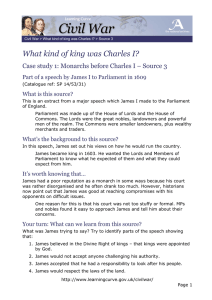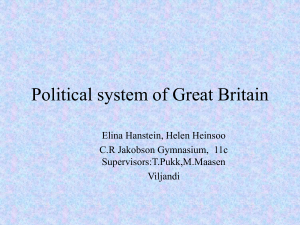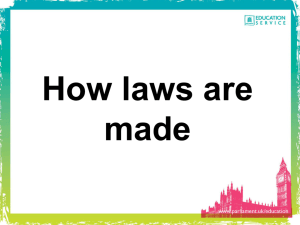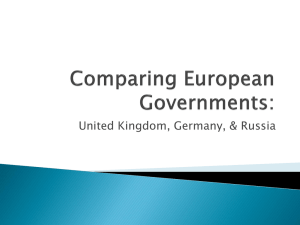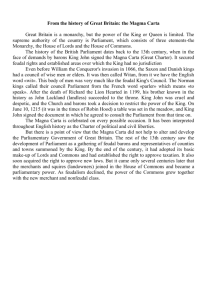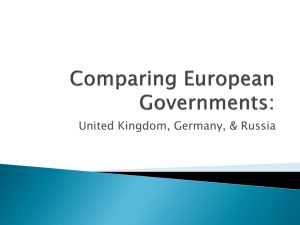Monitor FOI Live 2005 Third Annual Information
advertisement
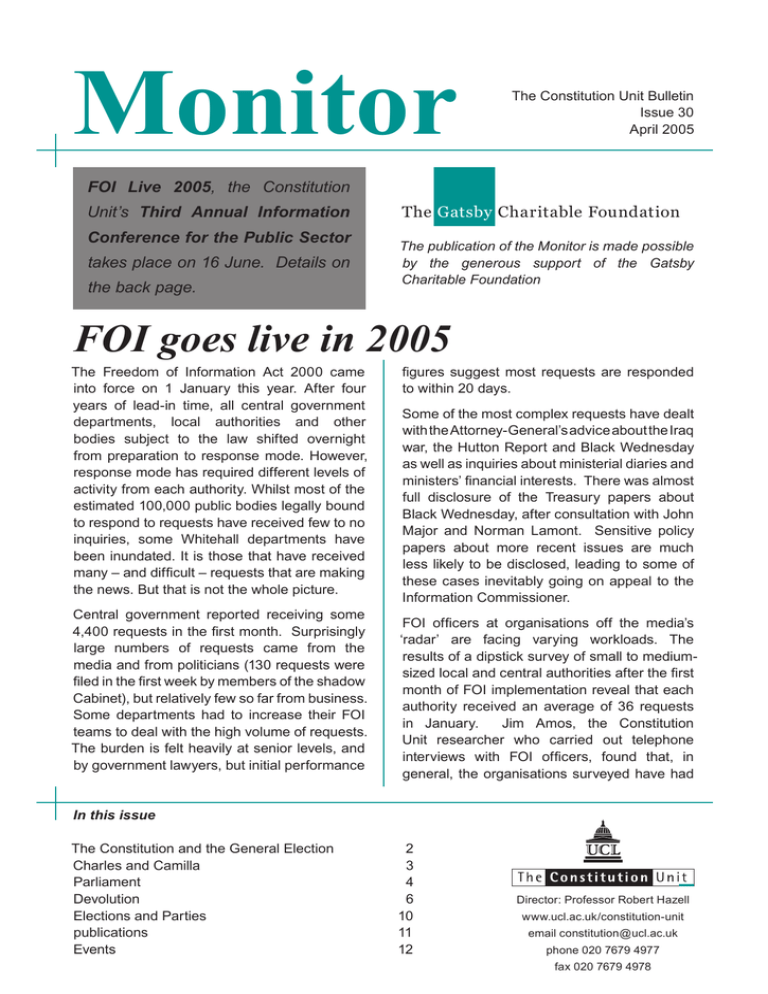
Monitor The Constitution Unit Bulletin Issue 30 April 2005 FOI Live 2005, the Constitution Unit’s Third Annual Information Conference for the Public Sector takes place on 16 June. Details on the back page. The Gatsby Charitable Foundation The publication of the Monitor is made possible by the generous support of the Gatsby Charitable Foundation FOI goes live in 2005 The Freedom of Information Act 2000 came into force on 1 January this year. After four years of lead-in time, all central government departments, local authorities and other bodies subject to the law shifted overnight from preparation to response mode. However, response mode has required different levels of activity from each authority. Whilst most of the estimated 100,000 public bodies legally bound to respond to requests have received few to no inquiries, some Whitehall departments have been inundated. It is those that have received many – and difficult – requests that are making the news. But that is not the whole picture. Central government reported receiving some 4,400 requests in the first month. Surprisingly large numbers of requests came from the media and from politicians (130 requests were filed in the first week by members of the shadow Cabinet), but relatively few so far from business. Some departments had to increase their FOI teams to deal with the high volume of requests. The burden is felt heavily at senior levels, and by government lawyers, but initial performance figures suggest most requests are responded to within 20 days. Some of the most complex requests have dealt with the Attorney-General’s advice about the Iraq war, the Hutton Report and Black Wednesday as well as inquiries about ministerial diaries and ministers’ financial interests. There was almost full disclosure of the Treasury papers about Black Wednesday, after consultation with John Major and Norman Lamont. Sensitive policy papers about more recent issues are much less likely to be disclosed, leading to some of these cases inevitably going on appeal to the Information Commissioner. FOI officers at organisations off the media’s ‘radar’ are facing varying workloads. The results of a dipstick survey of small to mediumsized local and central authorities after the first month of FOI implementation reveal that each authority received an average of 36 requests in January. Jim Amos, the Constitution Unit researcher who carried out telephone interviews with FOI officers, found that, in general, the organisations surveyed have had In this issue The Constitution and the General Election Charles and Camilla Parliament Devolution Elections and Parties publications Events 2 3 4 6 10 11 12 Director: Professor Robert Hazell www.ucl.ac.uk/constitution-unit email constitution@ucl.ac.uk phone 020 7679 4977 fax 020 7679 4978 ISSN 1465–4377 no major problems responding to requests. They do, however, face longer term issues such as ensuring uniform awareness of the law across all sections and divisions of authorities and utilisation of efficient and effective tracking and monitoring systems. Though it is too early to make pronouncements about the FOI Act’s effect on government transparency or public trust, there are some encouraging signs. In March DEFRA disclosed the subsidies paid to individual farmers and landowners under the Common Agricultural Policy, despite lobbying from the industry and objections that the disclosures breached data protection. The same week saw publication under FOI of the resignation letter of Elizabeth Wilmshurst, Deputy Legal Adviser in the Foreign Office, which gave her reasons for disagreeing with the government’s view about the legality of the war on Iraq. The Constitution Unit is planning a major survey of FOI requesters in summer 2005, which should enable us to report in future issues on who is using FOI, what information they are seeking, and how satisfied they are with the government’s response. The Constitution and the General Election With May 5 announced as the date for the General Election, the following are the main constitutional issues likely to be on the agenda during the election campaign. On devolution, the Conservatives are set to ask the West Lothian Question once again, and will propose that Scottish MPs be barred from voting when the legislation under debate does not affect Scotland. Though unlikely to incite passions among English voters, a narrow Labour majority may yet bring this issue to the fore in the next parliament, if controversial English legislation depends on Labour’s Scottish ranks for its passage. The future of the National Assembly for Wales will also be up for grabs, with Plaid Cymru and the Liberal Democrats committed to strengthening its powers, and the Conservatives proposing a ‘preferendum’ with options ranging from devolution of primary legislative powers to outright abolition. The 2 The basic premises of the law are as follows: • Who? The FOI Act allows anyone the right to information held by public authorities in England, Wales and Northern Ireland (Scotland has its own FOI Act). • What? Requests can be made for any information the public authorities or publicly-owned companies hold. Although exemptions may apply, the spirit of the law is toward disclosure. • How and how much? Requests must be made in writing (electronic communication is acceptable) but they do not have to be identified as FOI requests nor does an explanation have to be given by the requester as to his/her motives for seeking the information. There is no charge for a request; however, the upper limit on time spent per request is two and a half days or £600 worth of work by central government and £450 by local authorities. Beyond this limit a request can be refused. • Turn around time? In most cases, civil servants and public officials are required to respond to the requests within 20 working days. • Appeals? If the requester is not satisfied by the response received, a series of appeals can be made to the department, the Information Commissioner’s Office and the Information Tribunal (in that order). Conservatives remain committed to abolishing the unelected regional chambers in England, but it remains unclear what alternative strategy to directly-elected regional assemblies (killed by the North-East referendum) Labour and the Liberal Democrats will offer. At Westminster, the Conservatives would reduce the House of Commons to 525 MPs; 440 for England, 46 for Scotland, 33 for Wales. If the Welsh ‘preferendum’ resulted in primary legislative powers for the Assembly, the number of Welsh MPs would be reduced to 26. The representation of Scotland and Wales would thus be reduced to 20 per cent below Monitor: Issue 30—April 2005 ISSN 1465–4377 the English quota, following the precedent of Northern Ireland representation being reduced by a third during the 1922-1972 Stormont Parliament. In the Lords, the Conservatives and Liberal Democrats are likely to propose a reformed house consisting of 80 per cent elected members. Labour may want to define more tightly the powers of the Lords in relation to primary and secondary legislation, to remove the remaining hereditary peers, and to put the House of Lords Appointments Commission on a statutory basis. Charles and Camilla The royal marriage announced on 10 February 2005 raised two questions about its possible validity. The first was whether the marriage had the consent of the Sovereign, under the Royal Marriages Act 1772, and whether the Sovereign’s consent had been given on advice. It quickly became apparent from the congratulations which came, first from Buckingham Palace and then from 10 Downing Street, that the marriage had the consent of the Sovereign and the support of the Government. Such consent is not necessarily automatic: in 1953 the Churchill Government indicated that it would not be able to advise in favour of a marriage between Princess Margaret (then third in line of succession) and a divorced man, Gp Capt Peter Townsend. The marriage did not take place. The second question was whether members of the Royal Family could validly get married in a civil ceremony. The 1836 Marriage Act permitted civil marriages for the first time, but under section 45 the Act did not ‘extend to the marriage of any of the Royal Family’. A similar saving was included in the Marriage Act 1949, which provided in section 79: ‘nothing in this Act shall affect any law or custom relating to the marriage of members of the Royal Family’. In 1953 it was understood this meant that Princess Margaret could only contract a valid marriage in church. In the Lords on 23 February the Lord Chancellor Lord Falconer explained that the Government now took a different view, not least because of the Human Rights Act 1998. This requires legislation to be interpreted in a way that is compatible with the right to marry Monitor: Issue 30—April 2005 (ECHR Article 12), and to enjoy that right without discrimination (Article 14). If members of the Royal Family cannot get married in church (e.g. because they are divorced), and cannot validly marry in a civil ceremony, then they lose their right to marry. Hence the new interpretation of section 79 of the 1949 Act, that it does not require all Royal marriages to be held in church, but merely preserves some of the other customs of royal weddings. Not everyone was convinced. Sir Nicholas Lyell QC, former Attorney General, said there was a need for the Government to introduce a short bill to put the matter beyond doubt. A short bill could also have permitted the royal couple to marry in Windsor Castle rather than in the registry office in Windsor town hall. But with very little parliamentary time left before the election it is not surprising the Government was reluctant to do so. It is already being forced to abandon much bigger measures, such as the Identity Cards bill, because of difficulties in the Lords. A bill could have exposed the archaic law on Royal marriages to calls for wider reform. Three reforms have been proposed in recent years in private member’s bills introduced by Lord Archer of Weston-Super-Mare (1998), Lord Forsyth of Drumlean (1999) and Lord Dubs (2004). They would remove the discrimination in the Act of Settlement 1701 which prevents a Roman Catholic or anyone married to a Catholic from succeeding to the throne; change the rule of male primogeniture and give equal rights to female heirs; and repeal or restrict the Royal Marriages Act 1772, which regulates the marriages of all the descendants of George II. In the debate on Lord Dubs’ bill (14 January 2005) the Lord Chancellor did not say the law would never be changed, but indicated the Government had no immediate plans to legislate. A major complicating factor is that under the Statute of Westminster 1931 the law on succession to the throne cannot be changed without first gaining the assent of all 15 Commonwealth countries of which the Queen is also head of state. Meanwhile in the Commons Jonathan Sayeed MP introduced a 10 minute rule bill on Succession to the Crown and Retirement of 3 ISSN 1465–4377 the Sovereign. It proposed a retiring age of 75 (but not affecting the present Queen); and for Parliament to choose the most suitable successor from among the Sovereign’s heirs (but not affecting the succession of the Prince of Wales). The Monarchy has been off limits for constitutional reformers; that may no longer be the case. Terrorism Bill: Home Secretary vs the Judges The law lords ruled in December that the indefinite detention without trial of suspected foreign terrorists under Part 4 of the Anti-Terrorism, Crime and Security Act 2001 was unlawful (A v Home Secretary [2004] UKHL 56). The law lords quashed the derogation order from ECHR Article 5, and declared that indefinite detention was a disproportionate response to the threat of terrorism, and discriminatory if applied only to foreign nationals. If the Government were to continue to detain terrorist suspects, immediate legislation was necessary, because in any event Part 4 was due to lapse if not renewed by 14 March. To replace Part 4, the new Prevention of Terrorism Bill authorised the Home Secretary to make control orders against someone suspected of terrorismrelated activity. Control orders may be made against any suspect, regardless of nationality, and include 15 kinds of restriction extending to curfews, tagging and house arrest. This would be the first time house arrest had been used in the UK, and the first time restrictions could be imposed on the liberty of citizens without their being charged or convicted of an offence. The House of Commons passed the bill in just two days, but in response to concerns expressed there the government amended the bill to introduce judicial review of control orders. In the Lords the judicial review provisions were significantly tightened, in a marathon sitting which saw 19 Government defeats, and frenzied ping-pong between the two Houses. The emergency legislation will have to be reviewed early in the new Parliament. 4 Hunting Act tested in the courts The Hunting Act 2004 was eventually passed by the Commons alone, under the Parliament Acts, because the Lords steadfastly refused to support a complete ban (January 2005 Monitor p. 4). The Countryside Alliance then brought a challenge to the validity of the Hunting Act, arguing that the Parliament Act 1949 was itself invalid. The argument was that since the original 1911 Parliament Act had been passed by both Houses, the 1949 Parliament Act (which reduced the Lords’ powers of delay from two years to one) had to be passed by the same route. The 1949 Act had itself been passed without the support of the Lords, and was therefore argued to be invalid. The argument was rejected in the High Court and in the Court of Appeal, which refused permission to appeal to the House of Lords (R v Attorney General, ex parte Jackson 22 February 2005). It would have been an extraordinary intrusion by the courts into the traditional preserve of Parliament if they had struck down the Parliament Act 1949, which has been an accepted part of the constitution for half a century. But surprisingly the Court of Appeal did not completely reject the applicants’ argument, leaving open the possibility of ‘manner and form’ challenges to legislation which have hitherto not been a feature of the British constitution. Parliament Lords reform: third time lucky? Although reform of the Lords to remove the majority of hereditary peers was completed in 1999, ‘second stage’ Lords reform remains one of the notable items of unfinished business after two Labour terms in office. The 1997 and 2001 manifestos both promised further reform, but no government bill to implement this was ever introduced. At time of writing there was much speculation about what would appear in Labour’s next manifesto, and whether this would again repeat the commitment to a ‘more Monitor: Issue 30—April 2005 ISSN 1465–4377 representative and democratic’ chamber. Government sources had indicated to the press that Labour might commit to anything from an 80 per cent elected House (Independent, 11 March) to no further reform at all (interview with Baroness Amos, Daily Telegraph, 24 January). Whatever the manifesto does say, it seems clear that there remain divided opinions within government about the appropriate way forward. In February a cross-party group of parliamentarians launched an initiative, including a draft bill, aimed at ‘Breaking the Deadlock’. Coordinated by Paul Tyler MP, Liberal Democrat Shadow Leader of the House of Commons, the core group also included Robin Cook and Tony Wright (Labour) and Ken Clarke and Sir George Young (Conservative). Amongst its 33 supporters were former party leaders Neil Kinnock (now Lord Kinnock, Labour) and William Hague (Conservative). The group’s proposals were for a 70 per cent elected upper house, with a reduced number of bishops and the remainder appointed by a statutory Appointments Commission. All members would serve the equivalent of three House of Commons terms (in practice, 12-14 years) and the chamber would contain 385 members in total. Transitional arrangements would see existing peers leave the chamber in three tranches, although they would also be entitled to stand for public election. The proposals consciously sought to build on those of earlier groups, such as the Public Administration Committee and Royal Commission, and to reflect the balance of the Commons votes in February 2003. However, whilst they attracted wide support there are many others (notably the Prime Minister) who seem likely to remain unconvinced. Junior minister David Lammy responded by thanking the group for ‘a serious contribution to the debate’ (Commons Hansard, 23 February, col 93WH) but gave no indication of support or opposition. The group’s report is available from the Constitution Unit – see the back page for more details. The Tyler group chose not to recommend changes to the second chamber’s powers, although it is this that is most troubling some government ministers. Since reform in 1999 Monitor: Issue 30—April 2005 the number of defeats in the chamber has been rising, as it gains greater confidence to challenge the executive. The most vivid example was the marathon argument between the two chambers over the Prevention of Terrorism Bill in March, where the Lords defeated the Government 19 times before a compromise outcome was found. (This followed a Labour rebellion in the Commons where the Government’s majority had been cut to 14.) Already some figures in government had been hoping to trim the chamber’s powers, and such events will make them less enamoured than ever with the idea of reform that boosts its democratic legitimacy. However, changes to the chamber’s powers without reform of its membership would be deeply controversial. Although changes to powers were proposed by the group of Labour peers chaired by Lord Hunt, both the Conservatives and Liberal Democrats have declared themselves opposed, at least until the question of composition is settled. And given that these groups, along with the crossbenchers, hold the balance of power in the Lords itself, a bill to introduce such change would face immense opposition. In any such fight the Lords would have much of the press on its side, and probably public opinion. New members in the Lords Meanwhile arrangements for the ‘transitional’ Lords have continued to develop. In January Tony Blair indicated that retiring Archbishop of York David Hope and retiring Metropolitan Police Commissioner Sir John Stevens would be given life peerages. But increasing disquiet by the House of Lords Appointments Commission at the number of individuals being appointed by the Prime Minister as non-political peers resulted in 10 Downing Street issuing a statement indicating that there would be no more than 10 such appointments per parliament. Given that the original assumption was that the Appointments Commission (created in 2000) would be responsible for all non-party appointments, this set a new precedent. The by-elections to replace hereditary peers who die have also become a regular feature of the Lords since 2001. There were six such byelections during the parliament. Most recently 5 ISSN 1465–4377 the Earl of Glasgow was elected by Liberal Democrat hereditary peers, to replace Earl Russell. Similarly Lords Burnham and Aberdare (both Conservative) died in January and were replaced by Lord De Mauley and Viscount Eccles respectively. Commons sitting hours On 26 January MPs voted for a partial reversal of the Commons’ reformed sitting hours, to take effect from the start of the new parliament. In 2002 the reforms brought forward by Robin Cook had ended sittings on Tuesdays and Wednesdays after 7pm, and started them earlier in the mornings. These changes were agreed only by the narrowest of margins. Ever since there have been campaigns amongst MPs to revert to the previous arrangements, with complaints including the difficulty of scheduling select committee meetings, and the loss of atmosphere in Parliament in the evenings. Under the new compromise, agreed on a free vote by 292 to 225, the Commons will sit from 2.30 to 10pm on Tuesdays (as it does on Mondays) but will continue to meet from 11.30am to 7pm on Wednesdays. This decision was described by Commons leader Peter Hain as ‘a significant step backwards’. Cook’s changes had sought to encourage media reporting of parliamentary proceedings, by coinciding with newspaper deadlines and ironically the vote to revert to the old hours, taken at 4.30pm, attracted significant attention. Although the reversion was welcomed by many MPs one member (Helen Jackson of Sheffield Hillsborough) announced that it was the last straw in driving her to announce her retirement. Constitutional Reform Bill The Bill completed its Commons passage in February. The government has accepted that the office of Lord Chancellor should be retained, but persuaded the Commons to overturn requirements inserted by the Lords that the Lord Chancellor should be a senior lawyer and a member of the House of Lords. The Lords considered the Commons amendments in March. The Conservatives continued to insist on the Lord Chancellor being a peer and a lawyer, but without Liberal Democrat support 6 (or sufficient crossbenchers) could not sustain continued opposition to the government view. Lord Falconer may prove after all to be the last old style Lord Chancellor. Draft Civil Service Bill The consultation period on the draft Civil Service Bill (Cm 6373, November 2004) ended on 28 February. The Public Administration Select Committee published its response in February (HC 336). The committee repeats its previous concerns about the need to strengthen the Civil Service Commissioners, and to clarify the role and control the numbers of special advisers. But half the committee’s report restates the case for legislation, in order to maintain the pressure on the government to bring forward a bill in the next parliament. Devolution Scotland Politics in the Scottish Parliament has reflected the imminence of the UK general election. First Minister’s Question Time, theatrical politics in Scotland at its best or worst depending on taste, has witnessed some robust exchanges with election campaign themes well rehearsed. Health issues have been a source of significant clashes though whether significant substantial differences exist is unclear. Another matter to have come to the fore in the last quarter has been the Executive’s use of Sewel Motions in the Parliament. An enquiry into the use of these motions – designed to allow the Executive to allow Westminster to determine public policy in areas that have been devolved – has been provoked by the extent to which the device has been used. Lord Sewel, former Scottish Office Minister and eponymous originator of the motions, has questioned the manner and frequency of use of the device. In recent months, use of Sewels provoked criticisms. In mid-November proposals to introduce legislation which would have prevented the right-to-roam, restricting access to property previously deemed publicly accessible, was attacked by opposition Monitor: Issue 30—April 2005 ISSN 1465–4377 politicians as well as sections of the media. In December, a further use of a Sewel Motion to allow Westminster to legislate to permit ‘Super Casinos’ also met with criticism. In December 2004, the Procedures Committee agreed to conduct an inquiry into the use of Sewel Motions. A number of issues arise. First, the issue of whether Sewel Motions should be used at all. Secondly, if these Motions are deemed appropriate when should they be used? Thirdly, ought there to be some means of either maintaining closer scrutiny of legislation as it is passed through Westminster and/or ought the Scottish Parliament have the final say in ratifying such legislation? During the last quarter, another issue to creep up the political agenda has been immigration. South of the border, the debate on immigration has seen the two main parties articulate populist positions against a backdrop of antiimmigrant sentiment. In Scotland, population decline and widespread acceptance of the need for fresh talent has produced an alternative policy agenda, exemplified by the Executive’s launching of its Fresh Talent Initiative which appears to run in the opposite direction to the policies of the UK parties. An area of responsibilities reserved to the UK Government – immigration – has become a source of tension. The long twentieth-century Scottish agenda of concerns over population decline, which contrasted with the view in other parts of Britain that immigration was the problem, has spilled over into the twenty-first century. Wales In January, the First Minister announced a longanticipated cabinet reshuffle removing Jane Hutt from her post as Minister for Health and Social Services and replacing her with Aberavon AM Dr Brian Gibbons. Jane Hutt retains a cabinet position, taking over as Business Minister from Karen Sinclair who remains Chief Whip. Despite speculation that Dr Brian Gibbons was not the First Minister’s favoured choice, his appointment was welcomed by health practitioners hopeful the AM’s frontline experience as a GP would bring a different emphasis to the Assembly Government’s health policy. Monitor: Issue 30—April 2005 However, within days a damning Auditor General report criticising the Assembly Government’s failure to produce a strategy for tackling waiting lists put health once more into the headlines. This said that initiatives that had been tried to tackle the problem were “questionable value for money” and urged implementation of the recommendations of the Wanless Commission which the Assembly Government had set up on the issue a year earlier. The report noted that at the end of March 2004 while only 18 English patients had been waiting over six months for an outpatient appointment, 6,000 Welsh patients had been waiting over 18 months. Similarly while only 17 English patients had been waiting over 12 months for an inpatient appointment, 8,500 Welsh patients had been waiting this length of time. The criticism was swiftly followed by the intervention of the Secretary of State for Wales, Peter Hain, and other Labour Welsh MPs anxious that the Assembly Government’s health failings could undermine their prospects in the forthcoming general election. In an unprecedented intervention in a devolved policy area, Peter Hain urged the administration in Cardiff Bay to adopt English methods for tackling waiting lists, in particular walk-in diagnostic treatment centres. Plaid Cymru added to the embarrassment by tabling an Assembly debate on ‘Who Runs the Health Service in Wales?’ which united the opposition parties. In mid–March, First Minister Rhodri Morgan responded with new targets, pledging to reduce waiting times for outpatient and inpatients to 12 months by 2006, and six months by 2009. Although these targets do not meet Labour’s 18-week general election pledge for England, this is the first time the Assembly Government has introduced a total wait target for patients. While the First Minister heralded the announcement as the beginning of ‘dramatic inroads’ into the problem, it is unlikely that it will remove health from centre stage in the Welsh political debate. For instance, on the day of Morgan’s announcement the British Medical Association in Wales passed a vote of no confidence in the Assembly 7 ISSN 1465–4377 Government’s dealings in a pay dispute with NHS consultants. failure of the republican movement to recognise the rule of law. Northern Ireland The increasingly Jesuitical formulae crafted by the Sinn Féin president, Gerry Adams, to cope with these pressures saw his popularity plummet in the Republic while, in Washington, the McCartney sisters stole his St Patrick’s Day diary engagements, up to and including with the president, George W Bush. But there was consolation in polarised Ulster, where a poll showed support for himself and his party largely unaffected – alongside that for his historical nemesis, Rev. Ian Paisley. It was supposed to be the final, final deadline. And it was to be the ‘deal of all deals’. But on 8 December 2004, when the London and Dublin premiers, Tony Blair and Bertie Ahern, once more appeared in Belfast’s Waterfront Hall, symbol of post-agreement prosperity, the watershed was not to be. The elaborate arrangement would have made significant changes to the Belfast agreement. It was crafted with the Democratic Unionist Party and Sinn Féin as major interlocutors, rather than the more centrist Ulster Unionist Party and SDLP in mind. And the proposals, particularly for the appointment of first minister and deputy first minister, were even more consociationalist than the 1998 accord. Rather than representing a project linking devolution to reconciliation, they were premised on intercommunal mistrust. Mr Blair tried, disingenuously as it turned out, to suggest there was just one issue standing in the way of the ‘comprehensive agreement’ – the demand by the DUP for photographs of IRA weapons decommissioning. As ever, decommissioning did indeed dog the argument. But so too did its ever-present flip side – the refusal by the republicans to renounce violence. In the succeeding days and weeks, it was the latter that was to loom large. First, the junior party in Mr Ahern’s coalition, the Progressive Democrats, broke ranks in turning the spotlight on the IRA. Then, just 12 days after the nondeal, the IRA – as the chief constable, London and Dublin were soon agreed – carried off the biggest bank robbery in the British Isles, taking £26.5 million from the Northern Bank’s vaults in Belfast. Even this was topped, however, by a brutal IRA murder in a bar at the end of January, followed by widespread intimidation of witnesses. A courageous campaign for justice by the five sisters of the murdered man, Robert McCartney, from a small Catholic enclave, highlighted the 8 English Regions John Prescott insisted last month (on 11 February) that the Government’s commitment to greater regionalism had not wavered after the resounding ‘no’ vote in the North-East devolution referendum in November 2004. ‘I would emphasise there is still a regional dimension to all we do’, he told Labour’s spring conference in Gateshead. But for some delegates, John Prescott’s enthusiasm appeared to be waning as he emphasised that the eight unelected regional assemblies will still ‘lead’ on housing, planning, spatial strategy and economic development – ‘creating jobs and opportunities’. In truth, his reference to regionalism was one small part of a lengthy speech which concentrated in large part on the Deputy Prime Minister’s five-year housing plans. Whilst regional structures, such as Government Offices and regional assemblies, cannot be easily disestablished, the ODPM is clearly casting around for other initiatives. On the broader regional front, it is clear that the Conservative Party will exploit the North-East referendum – and the consequent uncertainty surrounding non-elected assemblies – during the General Election campaign. For the shadow cabinet, the rejection of the elected assembly equals rejection of the whole ODPM regional agenda. If elected, they have committed to scrapping the Regional Assemblies and to also seriously consider the future of the eight RDAs created in 1999. Powers will instead be devolved to local government. In some of the assemblies themselves, there is clearly uncertainty. The Monitor: Issue 30—April 2005 ISSN 1465–4377 North East Assembly is slimming down and cutting staff. The South-East England and East of England regional assemblies have refused to approve the level of new-build houses desired by ODPM. There have been some demands from Conservative authorities to pull out of the assemblies. Whilst it is clearly premature to sound their death knell, questions about their function, and direction, are certain to be asked after a May election. If Labour is not returned to power, then everything is up for grabs. On the back of the Conservatives’ review of Whitehall by the trouble-shooter David James, RDAs, other regional institutions, and even Government Offices, created under John Major, could be slimmed down or scrapped. At the same time, the economic aspect of Labour’s regional agenda continues to advance. On 1 April 2005 RDAs take on the Business Link franchises across England, adding considerable spending power and strategic control to their policy competence. RDAs will also take on some of the powers of the Countryside Agency, and with the Single Regeneration Budget being phased out, they will have far more free spending power than previously. ODPM also appears to have rediscovered the agenda of elected mayors. Although John Prescott was never a fan of elected, USstyle mayors, his departments – doubtless nudged by Downing Street, is pushing for more of them although, for the moment, no new moves are being considered to push this cause. The ODPM says ‘conversations’ will be taking place, particularly in big cities such as Manchester and Birmingham, to persuade reluctant councils that they should embrace the mayoral agenda. At present no big city, apart from London, has an elected mayor – and, rather pointedly, Manchester (where a flurry of new governance initiatives was launched on 31 January to coincide with Prescott’s sustainable communities summit) has rejected the idea out of hand. In Downing Street, some are now suggesting that stronger measures might be needed beyond the current powers which stipulate that a council must hold a mayoral referendum if it is presented with a petition by five per cent of the electorate. Monitor: Issue 30—April 2005 The Centre The question of Scottish over-representation at Westminster was finally put to bed in early 2005, with the passing of the Parliamentary Constituencies (Scotland) Order 2005. This order brings Scottish parliamentary representation in line with that of England meaning that at the next general election, Scotland will return 59 MPs rather than 72 as was previously the case. Other legislative developments affecting the devolution settlement include the Transport (Wales) Bill and the Public Services Ombudsman (Wales) Bill, both of which were requested by the National Assembly for Wales, included in November’s Queen’s Speech and introduced to Parliament shortly afterwards. These bills are relatively uncontroversial and enjoy cross-party support in Wales but preelection legislative congestion may yet scupper the chance of either of them reaching the statute book. Their loss would highlight the extent to which Assembly priorities remain hostage to the legislative programme of the UK Government and would add fuel to the fire of those advocating ending this dependence by giving the Assembly primary legislative powers. The history of the Ombudsman bill also offers revealing insights into the complex nature of inter-institutional linkages post-devolution. At the executive level, the UK and Welsh Assembly Governments have cooperated throughout the bill’s life, from the pre-legislative consultation exercises launched in 2002 and 2003 to the current navigation of the bill through Parliament. Meanwhile, the evolution of links between Parliament and Assembly is evidenced by the joint inquiry into the bill that the Commons Welsh Affairs Committee and the Assembly Local Government and Services Committee held even as it was completing its Lords stages. The draft Higher Education (Northern Ireland) Order paves the way for the introduction of university top-up fees in the six counties. A motion in favour of the order was defeated in the Northern Ireland Grand Committee, where the Government has no majority, but 9 ISSN 1465–4377 the Government ignored this non-binding vote and in the Commons and Standing Committee, Labour majorities duly approved the order. The order is due to be considered by the Lords on 22 March. The specificities of politics in Northern Ireland render unlikely the type of reaction against the UK Government that might be expected in similar circumstances in Scotland or Wales. Nevertheless, the issue of Northern Ireland’s ‘democratic deficit’ was raised by some opposition MPs, while a Conservative MP’s Early Day Motion criticised those English Labour MPs who had opposed top-up fees for England and Wales but now supported them for Northern Ireland. Elections and Parties Funding of parties and elections The way elections and parties are funded has been simmering away as an issue for a while, as party membership declines and media coverage of party funding ‘sleaze’ increases. The Electoral Commission recently put forward a list of suggestions for reform, following an extensive research and consultation exercise. The Commission’s report – The Funding of Political Parties – recommended that existing spending limits on parties at elections be rebalanced, away from the national campaign (where the limit would be reduced from £20m to £15m) and towards the local campaign (by doubling candidates’ election allowances). This, the Commission argued, would strengthen local campaigns, which research showed to be an important stimulant to turnout. The Commission rejected the introduction of caps on donations – at least for the time being – partly because this would require a substantial increase in state funding to make up the shortfall to the parties. But while the Commission rejected a large increase in state support, it did recommend two extensions. First, the introduction of tax relief on small donations, to encourage the parties to widen their funding base. Second, the extension of policy support grants to small parties in the European and devolved parliaments. The Commission’s report drew on surveys and focus group work on public attitudes to 10 party funding. The survey work suggested that citizens were ill-informed about the way elections and parties were funded, and often held contradictory views on the issues. The main survey findings were that, while the current funding arrangements were the source of some public concern, there was overwhelming opposition to full state funding, with only 7 per cent favouring this option. However, when the issue was discussed in more detail with small focus groups, this opposition diminished; indeed, full state funding was then supported as a means of reducing ‘sleaze’. Political engagement Following an initial audit of political engagement among British citizens in 2004, the Electoral Commission and Hansard Society have issued the results of a follow up survey. Covering six measures of knowledge/interest, action/ participation and efficacy/satisfaction, the report highlights the generally weak level of engagement between citizens and their political system. While a bare majority (53 per cent) professed themselves interested in politics, a similar proportion (54 per cent) confessed to knowing little about politics. Since 2004, there has been a slight increase in non-electoral participation. However, as a harbinger of potential low turnout at the forthcoming general election, the proportion indicating they are likely to vote is, at 52 per cent, down on the already meagre 58 per cent recorded prior to the 2001 general election. Electoral administration Following complaints that the integrity of last summer’s local and European elections were undermined by the extension of postal voting, a legal case is considering specific allegations of misconduct. A special elections court in Birmingham is reviewing the election of six councillors, said to have been involved in widespread forgery of returned postal ballots at the 2004 local elections. The case increases the pressure on the Government to introduce tighter safeguards on postal voting, although no changes will be made before the general election. Monitor: Issue 30—April 2005 ISSN 1465–4377 A recommendation of the Electoral Commission that the Government has agreed to is the reduction of the minimum age at which someone may stand for election to public office from 21 to 18. England and Wales will follow the lead of Scotland, which has already introduced such a move for local elections. The change in candidacy requirements comes just three centuries after the minimum age limit was introduced by the Parliamentary Elections Act 1695. The Moderniser’s Tale: Why Modernisation in Local Government must continue, by Dan Corry and Ian Parker, New Local Government Network, www.nlgn.org.uk Church and State Recent Constitution Unit Publications The Unit has been successful in obtaining funding from the Department for Constitutional Affairs and the Joseph Rowntree Charitable Trust for a project on Church and State. The first phase (funded by the DCA) is a mapping exercise, to chart the basis of relations between the Church of England and the State. This will give a detailed and up-to-date account of how those relations operate today, plus a comparative account of Kirk/State relations in Scotland and analogous arrangements in selected other countries. The study will start with an account of the higher constitutional arrangements, for example the requirements of the Act of Settlement and the presence of the bishops in the House of Lords; but it will extend also to cover such matters as chaplaincy support in the NHS, the armed services and prisons, and heritage expenditure on church buildings. This first phase will conclude with a report giving an account of the current state of Church/State relations. The exercise will then move on to a second phase (funded by Rowntree) which is more concerned with looking at how Church/State relations might be expected to evolve in the future. Publications Received The Good Governance Standard for Public Services, Independent Commission on Good Governance in the Public Services, www.opm. co.uk, www.cipfa.org.uk Government by Inquiry, House of Commons Public Administration Select Committee, HC 51-I and 51-II (Evidence), January 2005 Monitor: Issue 30—April 2005 Building Better Democracies: Why political parties matter, by Peter Burnell, Westminster Foundation for Democracy, www.wfd.org Dare More Democracy, by Neal Lawson, Compass, www.compassonline.org.uk Reforming the House of Lords, Kenneth Clarke, Robin Cook, Paul Tyler, Tony Wright and George Young, £10, ISBN: 1 90390 339 4, 72pp Access to Personal Information – A handbook for officials, John Woulds and Graham Sutton, £10, Constitution Unit, ISBN 1903903416, 35 pp Devolution, Law Making and the Constitution, edited by Robert Hazell and Rick Rawlings, £35 (hardback), ISBN: 1 84540 037 2, 350pp Effective Scrutiny: tools and intended outcomes, Mark Sandford, £8 (paperback), ISBN: 1 90390 340 8, 34pp All of the outputs of the Effective Scrutiny project (six reports) are now available for a special discount price of £35 Other publications by members of the Constitution Unit Building New Labour: The politics of party organisation, Meg Russell, Palgrave, £18.99 (paperback), ISBN: 1 4039 3994 2, 323pp Must Politics Disappoint?, Meg Russell, Fabian Society, £6.95 (paperback), ISBN: 0 7163 0614X, 63pp ‘The House of Lords’, Meg Russell, in Parliament in the 21st Century, edited by Nicholas Baldwin, £25 (hardback), ISBN: 1 84275 103 4, 368pp 11 BulletinBoard Third Annual Information Conference for the Public Sector: FOI Live 2005 On Thursday, 16 June, the Constitution Unit will hold the Third Annual Information Conference for the Public Sector: FOI Live 2005 in partnership with the Information Commissioner’s Office and the Department for Constitutional Affairs. Throughout the day, delegates will be able to explore answers to many of the questions which have arisen since 1 January regarding FOI implementation. The programme includes talks by guest speakers Lord Falconer, Secretary of State for Constitutional Affairs; Marie Shroff, Privacy Commissioner of New Zealand; Richard Thomas, Information Commissioner; and Andrew McDonald, Constitution Director at the Department for Constitutional Affairs. In addition to plenary sessions led by these experts, the conference will offer opportunities to learn about more specific information rights topics during the afternoon seminars as well as ample time for networking throughout the day. This year’s conference promises to be the event of the FOI and DP calendar. To find out more, please visit the conference website at www.involve-me-secure.com/foilive2005/default.asp, or contact Michael Hanton, FOI Event Coordinator, Complete Support Group. foi@completesupport.co.uk. Forthcoming Events at the Constitution Unit • Parliament and the Media • Britain’s Place in Europe and the New EU Constitution Peter Riddell, Political Correspondent, The Times and member of the Puttnam Commission on Parliament in the Public Eye Anand Menon, Director, European Studies Institute, University of Birmingham 1pm, Thursday 16 June 6pm, Tuesday 5 July Constitution Unit News Two of the Unit’s senior researchers are heading for pastures new in the coming months. Dr Scott Greer has accepted an assistant professorship in the School of Public Health at the University of Michigan, starting in September. Scott will, however, be back at the Unit quite frequently as he will be managing ongoing research projects here on devolution and health policy. Dr Ben Seyd will be leaving us in September to take up a post as Lecturer in Politics at the University of Kent. On the other side of the balance sheet, John Lucas has joined the team, having completed his history degree at Oxford University. John is providing assistance to the FOI team and on the new Church and State project. In addition, the Unit has recruited three new part-time administrators in the past few months. The new faces are Iyan Adewuya, Khadijah Elshayyal and Rory O’Rourke, all of whom are current postgraduate students here at the School of Public Policy. The Constitution Unit, School of Public Policy, UCL, 29–30 Tavistock Square, London, WC1H 9QU
